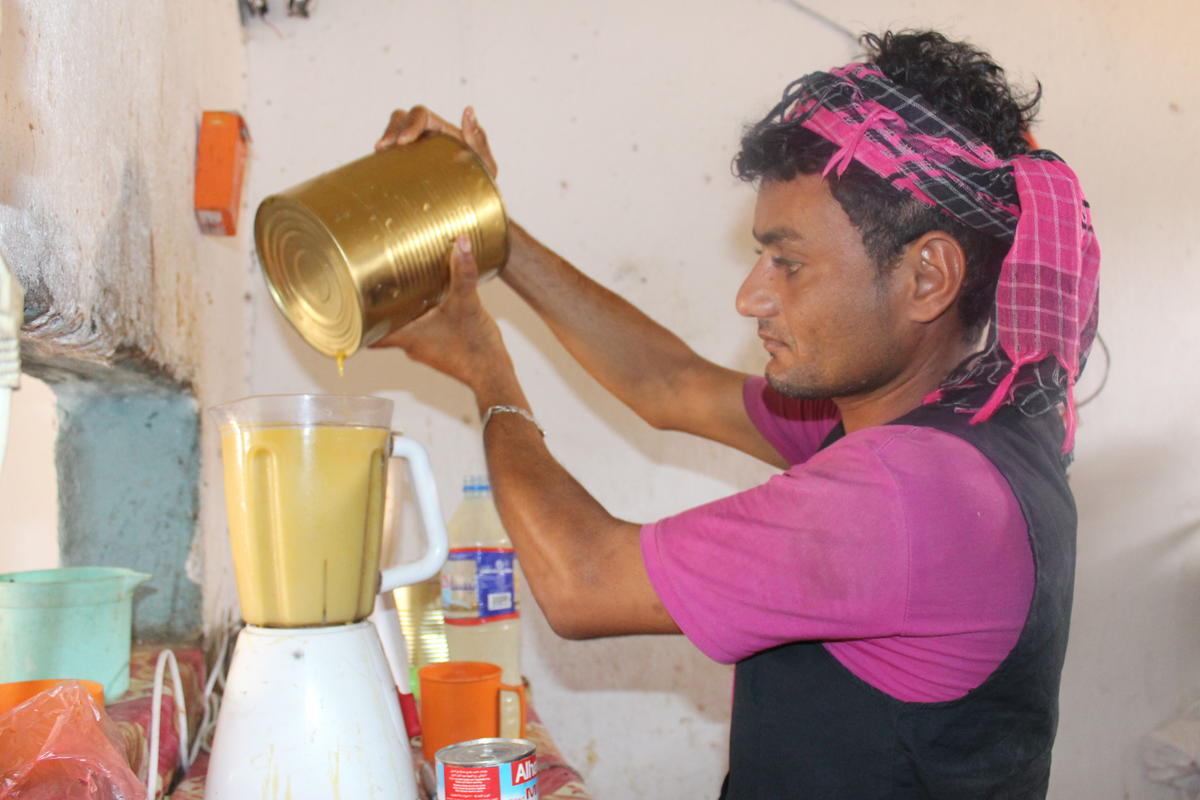Yemeni refugee serves up a taste of home in Djibouti

Yemeni refugee serves up a taste of home in Djibouti
Under the hot searing sun in the small coastal town of Obock, patrons line up in front of a modest two-room building to place their orders at Haytham’s Restaurant.
In a separate, but adjacent one-room building, cooks are busy frying fish as sheets of flat bread are placed in the oven. Its lunchtime and the staff are bustling about, serving up a taste of Yemen in Djibouti.
At the center of it all is restaurant owner, Haytham Mohamed Abdo, who fled his home in Moza’a, Yemen at the onset of the conflict in 2015.
“I chose to come here because it is close to Yemen,” he says. “It was also the one place I knew of that was welcoming refugees.”
Haytham felt right at home in Obock, which is just 90 kilometres from Yemen. The long history and cultural ties between the two regions have created a brotherhood between the two sides of the Gulf of Aden.
Situated in the heart of Obock, the restaurant has not only given people a taste of Yemeni cuisine, it has brought together the community. Prior to its establishment, there was only one other restaurant run by the locals. Now, there’s more diversity on offer and a way for all to enjoy the infamous Yemeni fish dishes.
Back in Yemen, Haytham’s father was a restaurateur and growing up, he learned the ropes of the business. Coming to Djibouti meant that he had to tap into his existing know-how to survive. As the Government of Djibouti grants freedom of movement to refugees, Haytham was able to move from Markazi settlement where he initially lived to Obock so that he could set up his business.
He started with a juice bar, where he imported all the ingredients and blenders from Yemen. After a year and a half, he transformed the modest juice bar into a sit-in restaurant, catering to numerous hungry patrons daily. At only 23, he has managed to save enough money to grow his restaurant.
“Haytham brought with him Yemeni specialties, many of which were relatively unknown to the area.”
The fish served at the restaurant is caught fresh from the Gulf and other ingredients like vegetables, rice and flour are supplied by neighboring vendors.
“People always enjoy novelties in life, which is good for business,” says Abdoulrazack Kamil Ishak, a UNHCR staff and regular patron of the restaurant. “Haytham brought with him Yemeni specialties, many of which were relatively unknown to the area.”
In December 2017, the Government passed a milestone decree giving refugees the right to work. The refugee ID card, which all registered refugees possess, automatically serves as a work permit. Before the decree was passed, refugees like Haytham worked informally—many as fishers, tuk tuk drivers, and food vendors.
Haytham exemplifies the positive developments on legal reform in favor of refugees - solid achievements of the Comprehensive Refugee Response Framework (CRRF). This new approach is seeing local communities and refugees interact peacefully and the local authorities are allowing refugees to prosper, be self-sufficient and contribute to the economy.
Albert Katumba, UNHCR’s Senior CRRF officer based in Djibouti, outlines how this approach and the legal reforms in the country are impacting refugees like Haytham and locals as well.
“The success of Haytham’s business can be considered as one of the examples of the socio-economic integration as a result of refugees’ rights to undertake businesses due to the new laws,” says Katumba.
“The legal reforms not only offer protection for refugees, but also...financial independence and self-sufficiency.”
He adds that these reforms further establish Djibouti’s commitment to help refugees and advance its policies to boost their wellbeing and empower them.
“The legal reforms not only offer protection for refugees, but also pave the way for their financial independence and self-sufficiency,” he explains, adding that access to labor markets means they now have a formal path to employment.
“As it may take time for the local communities to adapt to such changes, we continue with our advocacy efforts on behalf of refugees,” adds Katumba.
“I hope to encourage others to do as I have and show them a path to self-sufficiency.”
While Haytham enjoys the results of the reforms and UNHCR’s advocacy, he also aspires to empower other refugees to be independent too.
“I hope to encourage others to do as I have and show them a path to self-sufficiency,” he says.
He has employed refugees in various capacities, from dishwashers to servers to cooks. He also often hires migrants passing through, in need of money. “They work for a day or two and then leave,” he says. “They help and we pay them what we can.”
Although he currently lacks the means to enlarge the restaurant, stock it regularly and struggles with rent and utilities which are expensive, he still hopes to expand his business. He also plans to stay in Djibouti and is engaged to a Djiboutian woman.
“I love my work and it is a pleasure to serve the people around me,” he says. “I hope I can continue to grow and be able to offer more to the community.”













